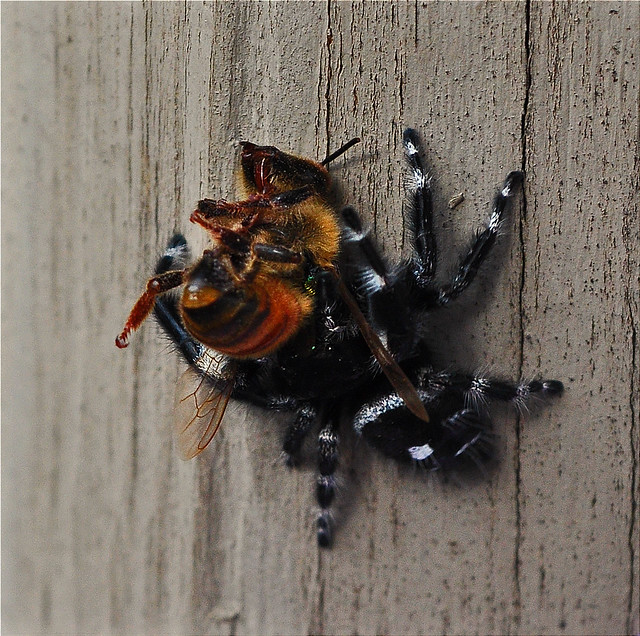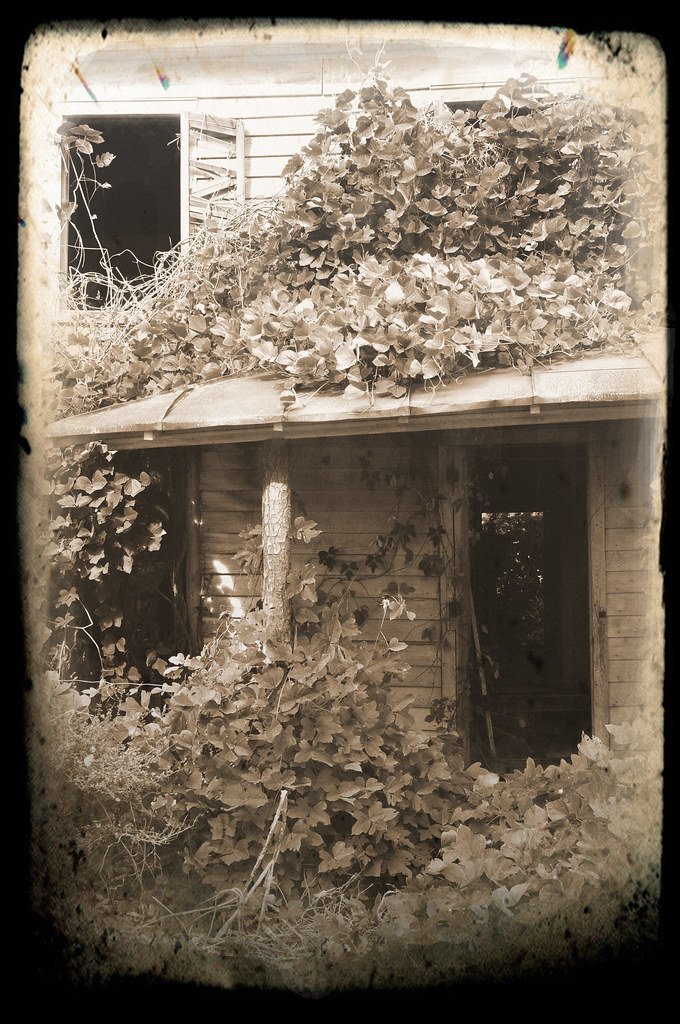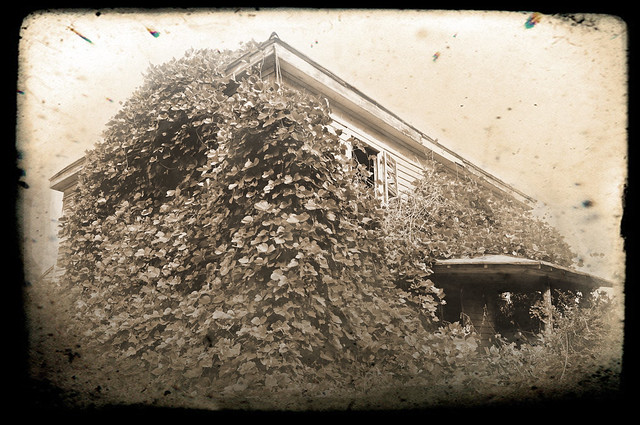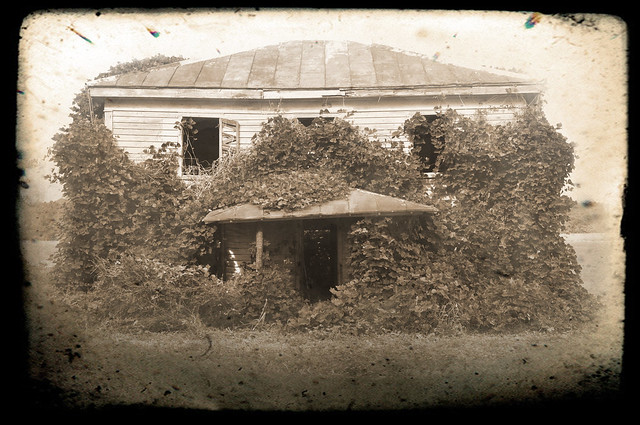Last week I visited the garden of some friends and was mildly surprised to see their Ramona Clematis in full bloom and being very photogenic. As I neared to take a picture I noticed what I first thought was some sort of bizarre looking honeybee with fuzzy black legs. Closer inspection showed it was a bee being carried by a Daring Jumping Spider (Phidippus audax). This is a fairly common spider who hunts among lovely blossoms for its next meal. The Jumping Spider does not use a web to catch its prey, but is a stalk and ambush predator. They do produce silk, though it is used to for egg laying, to hid in and as a safety line when travelling from one place to another. I am not sure why, but it never occurred to me that a bee could be prey, but I guess a brave little spider has to do what it has to do. Such drama in the garden.
November 4, 2010
October 31, 2010
The House on Indiantown Creek
Aaron and Elizabeth Deale were married shortly after his return from the war. Though the rest of the state lay largely in ruin, the people on this side of the bay remained mostly unscathed with an optimistic eye on the future. As a wedding gift to his son and new daughter-in-law, Moses Deale built a house on a bit of high ground overlooking Indiantown Creek. The elder Deale was famous on both sides of the bay for his boat building skills, and it was with these talents he built a simple yet sturdy house that despite wind and tide still stands today.
Shortly after moving in Elizabeth turned the new oak, pine and brick into a warm home filled with beautiful, but modest things. She surrounded the house with bountiful gardens that provided much for her pantry, as well as frequent bouquets for the alter at church. She was proud of her home, but was the talk and envy of many village women. Marriage suited the young couple well, and they soon found themselves anxiously expecting a child. As far as first pregnancies normally go, this one was unusually easy and Samuel Deale entered the world without incident. By all accounts he was a delightful baby, and everyone said he was the spitting image of Aaron, who could not have been prouder.
Elizabeth was not so fortunate with her second pregnancy and suffered through most of the months. Twin girls, Martha and Mary were born after an agonizing labor that nearly took the young woman's life. For the next few months when the twins weren't sleeping, they were crying. Elizabeth's body was slowly healing, but most said her soul never did. The house she was so prideful of became cluttered and dirty, and the garden was overrun with weeds, and vegetables rotted in their rows. Even during the daylight hours Elizabeth kept to her bed, and when her eyes were indeed open, they remained vacant. She could barely nurse the twins, and her affections for Samuel and Aaron were absent. The family would not have eaten or had clean clothes to wear if it had not been for the tireless efforts of Elizabeth's younger sister.
Elizabeth spent most of the summer in this depressed state, but rose abruptly from bed one cool October morning and began cleaning the house, and that evening she bathed the children. The next day she began cutting back the overgrown garden and dismissed her sister, thanking her and bidding her to return home. Aaron was deeply encouraged by this change in the wind and knew that the time spent on his knees in prayer had not been wasted. Later that week he came home from his day's work at the boatyard, and as he entered the clean kitchen noticed a full dinner plate covered with cheesecloth on a table set for one. He called out to Elizabeth, but the house remained quiet.
Aaron mounted the stairs leading to the bedrooms, and nearing the top he noticed Elizabeth's wrist hanging limply from the bed through the open door. A fallen spoon rested on the floor just out of reach of her fingers. Her skin was blue, her lips stained red brown and her body was cold. An empty bottle of laudanum sat on the night stand, glowing in the last of the day's sun. Samuel was in the bed as well, his skin and lips similarly colored. Martha and Mary lay smothered in the crib they shared in the corner by the window. Aaron ran from the house wailing like a stuck animal for all the village to hear, never to return.
After sitting vacant for several years, Moses Deale eventually rented the house to tenants for his absent son. No family ever stayed there more than a few months before moving on. Several of the tenants, especially the women, mentioned enduring bouts of incredible sadness while living there. One family was regularly awakened by the sound of falling silverware hitting the floor, only to search in vain for nothing amiss. One poor woman ran out of the house screaming in the middle of the night, tormented one time too many by the sound of another woman singing. Years passed and eventually the house was simply used for storage as no one would ever live there. The house still stands, but is covered in wild vines, glassless windows exposing the house to weather. Villagers claim that on still moonless nights you will occasionally hear the clang of a spoon hitting the floor or a mother's voice singing lullabies to her children coming from the old Deale house.
Shortly after moving in Elizabeth turned the new oak, pine and brick into a warm home filled with beautiful, but modest things. She surrounded the house with bountiful gardens that provided much for her pantry, as well as frequent bouquets for the alter at church. She was proud of her home, but was the talk and envy of many village women. Marriage suited the young couple well, and they soon found themselves anxiously expecting a child. As far as first pregnancies normally go, this one was unusually easy and Samuel Deale entered the world without incident. By all accounts he was a delightful baby, and everyone said he was the spitting image of Aaron, who could not have been prouder.
Elizabeth was not so fortunate with her second pregnancy and suffered through most of the months. Twin girls, Martha and Mary were born after an agonizing labor that nearly took the young woman's life. For the next few months when the twins weren't sleeping, they were crying. Elizabeth's body was slowly healing, but most said her soul never did. The house she was so prideful of became cluttered and dirty, and the garden was overrun with weeds, and vegetables rotted in their rows. Even during the daylight hours Elizabeth kept to her bed, and when her eyes were indeed open, they remained vacant. She could barely nurse the twins, and her affections for Samuel and Aaron were absent. The family would not have eaten or had clean clothes to wear if it had not been for the tireless efforts of Elizabeth's younger sister.
Elizabeth spent most of the summer in this depressed state, but rose abruptly from bed one cool October morning and began cleaning the house, and that evening she bathed the children. The next day she began cutting back the overgrown garden and dismissed her sister, thanking her and bidding her to return home. Aaron was deeply encouraged by this change in the wind and knew that the time spent on his knees in prayer had not been wasted. Later that week he came home from his day's work at the boatyard, and as he entered the clean kitchen noticed a full dinner plate covered with cheesecloth on a table set for one. He called out to Elizabeth, but the house remained quiet.
Aaron mounted the stairs leading to the bedrooms, and nearing the top he noticed Elizabeth's wrist hanging limply from the bed through the open door. A fallen spoon rested on the floor just out of reach of her fingers. Her skin was blue, her lips stained red brown and her body was cold. An empty bottle of laudanum sat on the night stand, glowing in the last of the day's sun. Samuel was in the bed as well, his skin and lips similarly colored. Martha and Mary lay smothered in the crib they shared in the corner by the window. Aaron ran from the house wailing like a stuck animal for all the village to hear, never to return.
After sitting vacant for several years, Moses Deale eventually rented the house to tenants for his absent son. No family ever stayed there more than a few months before moving on. Several of the tenants, especially the women, mentioned enduring bouts of incredible sadness while living there. One family was regularly awakened by the sound of falling silverware hitting the floor, only to search in vain for nothing amiss. One poor woman ran out of the house screaming in the middle of the night, tormented one time too many by the sound of another woman singing. Years passed and eventually the house was simply used for storage as no one would ever live there. The house still stands, but is covered in wild vines, glassless windows exposing the house to weather. Villagers claim that on still moonless nights you will occasionally hear the clang of a spoon hitting the floor or a mother's voice singing lullabies to her children coming from the old Deale house.
Subscribe to:
Posts (Atom)








